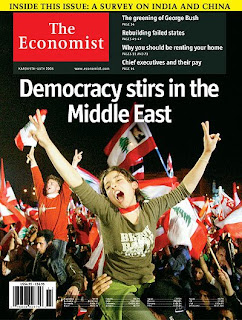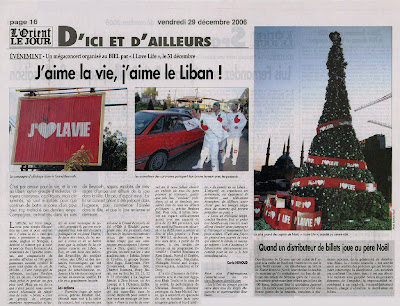Context
When former Lebanese prime minister Rafic El Hariri was brutally assassinated on Valentine’s day in 2005, in a huge blast that also claimed the life of 19 other civilians, people took to the streets, in one of the biggest demonstrations of grief and outrage that the country had witnessed in years. The country felt swept back into an era it had hoped it had surpassed, an era of summary execution of its various leaders, one which had plagued it throughout its long civil war. People rallied.
 The death of prime minister Hariri eventually brought to light the depth of the rift in the fabric of Lebanese society. His followers marched in millions to demonstrate against Syria, whom they blamed for his assassination, it was the Cedar Revolution. They went down to the streets one month after Hariri's death, on the 14th of March 2005, to chant their anger and allegiance to the leaders of various political parties, who had banded together to form what is now familiarly called the March 14 alliance. This large demonstration which captured the lens of many international media, was also a response to the equally large protest which took place only a few days earlier and in the same district of the city, that of the (now called) March 8th movement, which brought together the opposing political parties in the country, an alliance which is spearheaded by Hizbullah (or the Party of God). March 8th followers declared their respect and thanks for and (to a certain degree) allegiance to Syria, which had not wrought upon them throughout the long trials and tribulations of the civil war, as much damage as the other archenemy, Israel. And so it started, the opposition of 8 and 14.
The death of prime minister Hariri eventually brought to light the depth of the rift in the fabric of Lebanese society. His followers marched in millions to demonstrate against Syria, whom they blamed for his assassination, it was the Cedar Revolution. They went down to the streets one month after Hariri's death, on the 14th of March 2005, to chant their anger and allegiance to the leaders of various political parties, who had banded together to form what is now familiarly called the March 14 alliance. This large demonstration which captured the lens of many international media, was also a response to the equally large protest which took place only a few days earlier and in the same district of the city, that of the (now called) March 8th movement, which brought together the opposing political parties in the country, an alliance which is spearheaded by Hizbullah (or the Party of God). March 8th followers declared their respect and thanks for and (to a certain degree) allegiance to Syria, which had not wrought upon them throughout the long trials and tribulations of the civil war, as much damage as the other archenemy, Israel. And so it started, the opposition of 8 and 14.In order to keep the masses engaged, March14 relied on a group of advertising executives and “creatives” to create a campaign that would encompass the different groups that formed it. March 14 is an amalgam of the Future movement (Hariri’s party which has a large constituency of Lebanese Sunnis), the Lebanese Forces and the Phalanx party (Maronite Christians). Other smaller parties were also part of the movement. And so when the time came to find a rallying cry, the advertising consortium that was formed, deliberated and came up with the slogan: I LOVE LIFE.
 At first glance, the slogan sounds more like a soft drink tagline than a political statement. This might be due to the fact that the makers of the campaign included people whose backgrounds were all advertising agencies and had worked mainly on consumer products. However the real reason for the choice of “I LOVE LIFE”, and as stated in their website (www.lebanon-ilovelife.com), is that it created a bloc opposed to March8 generally, but more specifically Hizbullah. Although Hizbullah had been integrated into the Lebanese government with elected representatives, it was still widely regarded as a renegade group. It’s a party that still holds arms, it’s a party that still wages war on behalf of the country, it’s even a party that is considered by the US government as a terrorist organization. As such it represents a threat to life. Hizbullah fighters are known to conduct suicide missions. The martyrs are then praised, because they have accessed Heaven through its widest golden gates. As such, they are said to have a cult of death. The best answer to that on the March14 side was to celebrate life.
At first glance, the slogan sounds more like a soft drink tagline than a political statement. This might be due to the fact that the makers of the campaign included people whose backgrounds were all advertising agencies and had worked mainly on consumer products. However the real reason for the choice of “I LOVE LIFE”, and as stated in their website (www.lebanon-ilovelife.com), is that it created a bloc opposed to March8 generally, but more specifically Hizbullah. Although Hizbullah had been integrated into the Lebanese government with elected representatives, it was still widely regarded as a renegade group. It’s a party that still holds arms, it’s a party that still wages war on behalf of the country, it’s even a party that is considered by the US government as a terrorist organization. As such it represents a threat to life. Hizbullah fighters are known to conduct suicide missions. The martyrs are then praised, because they have accessed Heaven through its widest golden gates. As such, they are said to have a cult of death. The best answer to that on the March14 side was to celebrate life.The advantage of the I LOVE LIFE campaign was that it avoided a more specific political agenda. Remember that Lebanon had suffered through thirty years of civil war (among others). The parties constituting the March14 coalition had been at bitter odds against each other, and had inflicted countless casualties upon one another in earlier days. It would have been very difficult to come up with a slogan that could have been more specific politically, since the parties, who although they agree on the horror of Hariri’s execution, and its subsequent damage, might not necessarily agree on the means to achieve their aims. The I LOVE LIFE campaign also avoided any religious connotation, because the constituents of the greater March 14th alliance came from different religious backgrounds. The slogan was non-sectarian, thus more liberal, more open. In ignoring the details of the how and why and focusing their communication on the “other”, March 14 was more effectively united.
The Lebanese people are no strangers to political propaganda. During thirty long years, bitter words were exchanged between warring leaders, and were brought to the public via the available media at the time, namely television radio and newspapers. Lebanon, a relatively small country in size, boasts a fair number of stations, and it is safe to say that each station is affiliated to a particular party. The Lebanese recall quite well an era when Television Station 1 created little parodies about Leader 2, and Television Station 2 criticized Leader 1. On the radio, songs were performed by artists belonging to one party or the other, glorifying its beliefs and credo. So what was new this time around?
Politics as consumer product
Historically, in Lebanon (as elsewhere in the world), political posters and songs were created by artists either belonging to the party or having some affinity to it. However, the I LOVE LIFE campaign was not an impulsive/natural need of one or more artists to express themselves, or relay to the public the thoughts of March 14th. The I LOVE LIFE campaign was thought out by a group of advertisers and PR specialists, who had received (as for any other consumer brand) a brief, which had its budget, its target audience, its various media to be exploited. The I LOVE LIFE campaign was treated as a product campaign, to an extent that was never before seen in Lebanon. The brand was Lebanon. All advertising is about creating an image, a character for a brand, and in this case it was Lebanon as it wanted to be portrayed to the world, a life-loving, open, liberal country. A country that is known across the region for its higher education institutions, freedom of speech, sense of fashion, high-end services, and excellent entertainment and night-life. A country where all Arab nationals come to party, a country that is more westernized than any other in the Arab world. A country which westerners visit and fall in love with.
In terms of design, the I LOVE LIFE campaign adopted a familiar design, which also reinforced the more westernized image of March 14th - and suggested their pro-westernism - namely the use of a heart instead of the word love, instantly calling to mind I (HEART) NY. (Daniel Drennan writes in Electronic Intifada on December 7, 2007, that the campaign was actually funded by USAID - http://electronicintifada.net/v2/article6474.shtml.)
 The main visual for the campaign was therefore I (HEART) LIFE, written in a simple Sans Serif font (Impact), in white bold capital letters, set on a red background, with a small green leaf representing life and growth, on top of the heart. The campaign was produced in three different languages (Arabic, French, and English), which are interchangeably used when Lebanese people communicate with each other. The font in the Arabic visual also used a modern font, (AxtMarwan) and incorporated the heart. The campaign was launched at a first stage through billboards that were posted across the country, flooding the streets with red, white and green, which incidentally are the colors of the Lebanese flag. On billboards, on buildings, everywhere, I (HEART) LIFE was proclaimed. March 14th did not even need to sign the visual or claim it. No logo was incorporated into the design.
The main visual for the campaign was therefore I (HEART) LIFE, written in a simple Sans Serif font (Impact), in white bold capital letters, set on a red background, with a small green leaf representing life and growth, on top of the heart. The campaign was produced in three different languages (Arabic, French, and English), which are interchangeably used when Lebanese people communicate with each other. The font in the Arabic visual also used a modern font, (AxtMarwan) and incorporated the heart. The campaign was launched at a first stage through billboards that were posted across the country, flooding the streets with red, white and green, which incidentally are the colors of the Lebanese flag. On billboards, on buildings, everywhere, I (HEART) LIFE was proclaimed. March 14th did not even need to sign the visual or claim it. No logo was incorporated into the design.Such a campaign is not unusual. Countries all over the world create campaigns glorifying themselves, as seen on international media (Malaysia, truly Asia…). However these promotions are usually commissioned by ministry of Tourism, to sell the country to foreigners who might want to visit it. Rarely do such promotions target the people of the country itself. In this case, March14 was selling Lebanon to the Lebanese. It also sold it, with what is termed in advertising speak as “lifestyle” ads: ads that give an impression of the lifestyle of the brand, without specifying a core advantage per se, or selling a specific product. As, such, the campaign also differed from other political campaigns in the fact that it contained no call to action. In their book Political Persuasion and Attitude Change, Diana C. Mutz, Paul M. Sniderman and Richard A. Brody offer the following definition of politics: “Politics, at its core, is about persuasion. It hinges not just on whether citizens at any one moment in time tend to favor one side over another, but on the numbers of them that can be brought, when push comes to shove, from one side to the other or indeed, induced to leave the sidelines in order to take a side.”
On television, prominent personalities were enlisted to advertise why they "loved life in Lebanon", not unlike star endorsements of regular consumer products. Guy Manoukian (Lebanese musician/songwriter) seen in this clip: http://tinyurl.com/6277g9 explains that he loves life, because he is lebanese, because life inspires him, and allows him to write more sincere music. He then hints back to "the others" (and their "cult of death") by saying he wants to work, and live in Lebanon, he evens wants to die in Lebanon, but not just yet. The series of clips adopt a very simple format, The I (HEART) LIFE visual in the back, with speakers in front. The personalities chosen, reflect various political and sectarian directions. (More videos here: http://tinyurl.com/6lswh7, http://tinyurl.com/5otebs)
 The I (HEART) LIFE campaign however, did not ask people to vote, to donate money, or even to get politically engaged. Instead, it provided them with a political fashion statement, so to speak. It gave them a slogan that they could use ubiquitously, without doing anything else. Soon, stickers were distributed all over the city and people everywhere used them, on their cars, attached them to their mobile phones, on walls, on notebooks, on purses. T-shirts were printed and distributed.
The I (HEART) LIFE campaign however, did not ask people to vote, to donate money, or even to get politically engaged. Instead, it provided them with a political fashion statement, so to speak. It gave them a slogan that they could use ubiquitously, without doing anything else. Soon, stickers were distributed all over the city and people everywhere used them, on their cars, attached them to their mobile phones, on walls, on notebooks, on purses. T-shirts were printed and distributed.When Christmas approached, I (HEART) LIFE trees were decorated and placed throughout the country on main city roads. Musicians were invited to perform in trendy pubs and restaurants, and were kindly requested to repeat the slogan (I love life) in between songs performed. The main event of the campaign was a new year’s party, in one of Beirut’s newest and largest halls, featuring a plethora of Lebanese and foreign artists.
I (HEART) LIFE was indeed everywhere, a recognizable visual, for a recognizable “party”.

It is interesting to point out that the campaign was picked up by many. Whether this is proof of its success or not is debatable, but it was certainly testimony to its having become a familiar visual and theme. Indeed, after a few months of I (HEART) LIFE, no less than 5 brands started ad campaigns, which stated: “I love Carpets”, “I love life - with Diamonds”, “I love chicken turkey”…!
 The opposition
The oppositionThe campaign was widely adopted, but the most interesting use of it was the reply by March8. The March8 spoof version of the I (HEART) LIFE campaign was meant as criticism of both the campaign and of March14. In a very simple tactic, using one's words against him, March8 transformed the campaign to highlight what they construed to be March14’s more superficial enjoyment of life. By adding each time one or two simple words, (as if tagged with white spray paint, thus appearing more underground, more sincere) March8 claimed their higher values: The posters became: I love life- in peace, I love life-in dignity, I love life-undictated. The campaign, by appropriating the I Love Life slogan to its own purposes, also tries to dispel the image that was being denounced by the original: that March8 have a cult of death. The March 8 campaign, was signed however by a Rainbow (representing the different factions of the alliance and their respective colours) and the words : Lebanese Opposition.
For more pictures (and political comments):
http://tinyurl.com/56vdg8
http://mideast.blogs.time.com/2007/01/17/poster_politics/
http://mideast.blogs.time.com/2007/02/18/loving_life_in_lebanon/

No comments:
Post a Comment